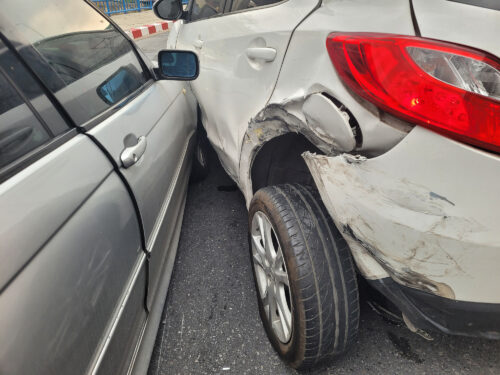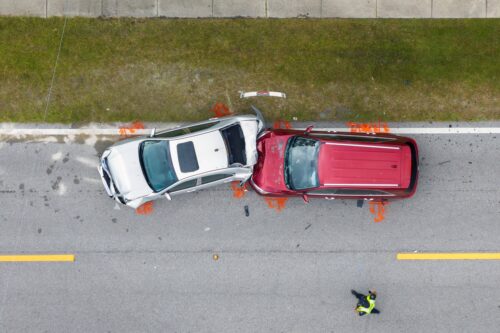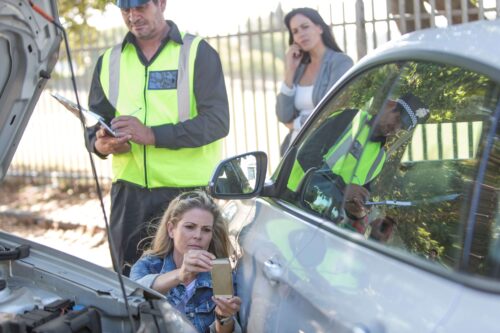
The Short Answer:
The moments after a car accident can be chaotic and confusing. If you were hurt, you may be wondering, “Should I go to urgent care or the emergency room?” For severe injuries, always choose the ER where providers are equipped to handle life-threatening medical events. For mild to moderate injuries, such as cuts and back pain, urgent care is normally sufficient. They may refer you to the hospital if your injuries are more severe than expected.
Key Takeaways
- Documenting your injuries is important for protecting your health and your legal rights.
- Medical records can be vital for establishing the severity of your injuries and recovering fair compensation.
- For minor to moderate car accident injuries, such as cuts requiring glue or stitches, visit an urgent care facility.
- For serious injuries, such as loss of consciousness, going to the ER is your best bet.
- Beware of latent injuries, such as whiplash and internal bleeding, that can take time to appear.
- Avoid toughing it out or delaying treatment as this can create a treatment gap that affects your car accident case.
- If you have questions or concerns about your medical records or insurance claim, talk to an auto accident attorney in Massachusetts as soon as possible.
Table of Contents
Visit the Emergency Room for Severe or Life-Threatening Injuries
When in doubt, always choose the ER or accept treatment from emergency medical services (EMS) at the scene of the accident. Don’t worry about the cost of an ambulance ride or extra medical bills. Now is the time to prioritize your health although you may have other worries.
Hospitals are equipped to handle critical injuries. In some cases, you may need to be transferred to a Level I Trauma Center. Fortunately, Boston has some of the best hospitals in the nation, including Mass General and Beth Israel Deaconess Medical Center. It’s important to remember that many people require intensive care or life flights after auto accidents. Even if you are lucky enough to get out of your vehicle and walk away, don’t hesitate to seek emergency medical care.
When to Go to the ER
For moderate to severe car accident injuries, don’t hesitate to accept emergency medical care or have someone drive you to the emergency room after you have been cleared to leave the scene. Here are a few situations where it’s smart to visit the ER or receive treatment from EMS.
- Loss of consciousness or blacking out, even briefly
- Obvious broken bones or deep cuts
- Head, neck, or back injuries
- Chest or abdominal pain
- Elevated pulse
- Uncontrolled bleeding
- Shortness of breath
- Dizziness, confusion, or irritability
- Vomiting or blurred vision
- Mood changes and other symptoms
Visit Urgent Care for Minor to Moderate Car Accident Injuries
If you had a minor rear-end accident or low-speed collision, you may feel fine after the accident, apart from being shaken up. After law enforcement leaves the scene, it’s still wise to visit your primary care doctor or an urgent care facility to rule out potential injuries.
When to Go to Urgent Care
Urgent care facilities are equipped to treat a variety of minor health concerns. They can diagnose broken bones with X-rays and order other tests to document your injuries. If they detect more serious problems, they may refer you to another provider or call an ambulance. Visit urgent care for any of the following injuries:
- Cuts, scrapes, and lacerations requiring stitches or glue
- Bone fractures, sprains, and soft-tissue injuries
- Minor burns up to 2nd degree or chemical exposure
- Head injuries or concussion without loss of consciousness
- Whiplash, neck strain, and rib bruises
- Asthma attacks or respiratory symptoms
- Mild to moderate body pain
Beware of Latent Injuries That Don’t Appear Immediately
Before, during, and after a car accident, you may experience a surge of adrenaline that can potentially mask pain for several hours. You may be in shock processing the facts of the accident before you realize the extent of your injuries hours or even days later. Some traumatic injuries may have few or subtle symptoms, including the following:
- Concussion: Traumatic brain injuries can cause headache, nausea, confusion, and light sensitivity. Your doctor may order an MRI or CT scan to check for brain bleeding and more serious issues.
- Soft Tissue Injuries: Symptoms of whiplash can develop immediately or within 24-72 hours. Your doctor may order an X-ray or MRI to rule out other injuries.
- Internal Bleeding: Hidden bleeding can cause life-threatening complications. Potential warning signs include deep bruising, abdominal pain, and lightheadedness.
- Hairline Fractures: Small bone fractures may initially be mistaken for deep bruises until the pain worsens over time.
Consequences: What Happens If You Don’t Document Injuries?
Delaying or refusing medical care at the scene of the accident or afterwards can cost you physically and financially. Without medical attention, you’ll miss important evidence documenting your injuries and linking them to the car accident. These records can be vital for supporting your case. Here are some potential consequences:
If you delay or refuse medical treatment, the insurance company or adjuster may minimize the severity of your injuries or try to claim that they were caused by something other than the accident. If you have a pre-existing back injury or other condition, you may wish to consult a car accident lawyer for advice on documenting your worsening symptoms.
Healthcare providers document nearly everything. Medical documents and test results from the ER or urgent care provider create an official, time-stamped record showing your injuries and linking them to the accident. This could be one of the most powerful pieces of evidence in your personal injury claim.
While it’s easy to avoid seeking appropriate medical care due to financial concerns and other limitations, failing to get checked out can create a gap in treatment that could devalue your claim or delay compensation for medical bills and suffering.
Contact Jim Glaser Law to Protect Your Health and Your Rights
After a car accident, your health is your first priority. No matter how minor or serious the car accident was, seeking immediate medical care at the appropriate facility is the best way to ensure that you’re okay. It also helps to document your injuries and protect your right to compensation.
If you’re worrying about things like how you’re going to pay your medical bills or get to work while your car is in the shop, reach out to us to speak to a car accident lawyer. Jimmy Knows!® how to help Boston residents who have been hurt in car accidents. Contact Jim Glaser Law in Cambridge or Sharon for a free consultation today.
















